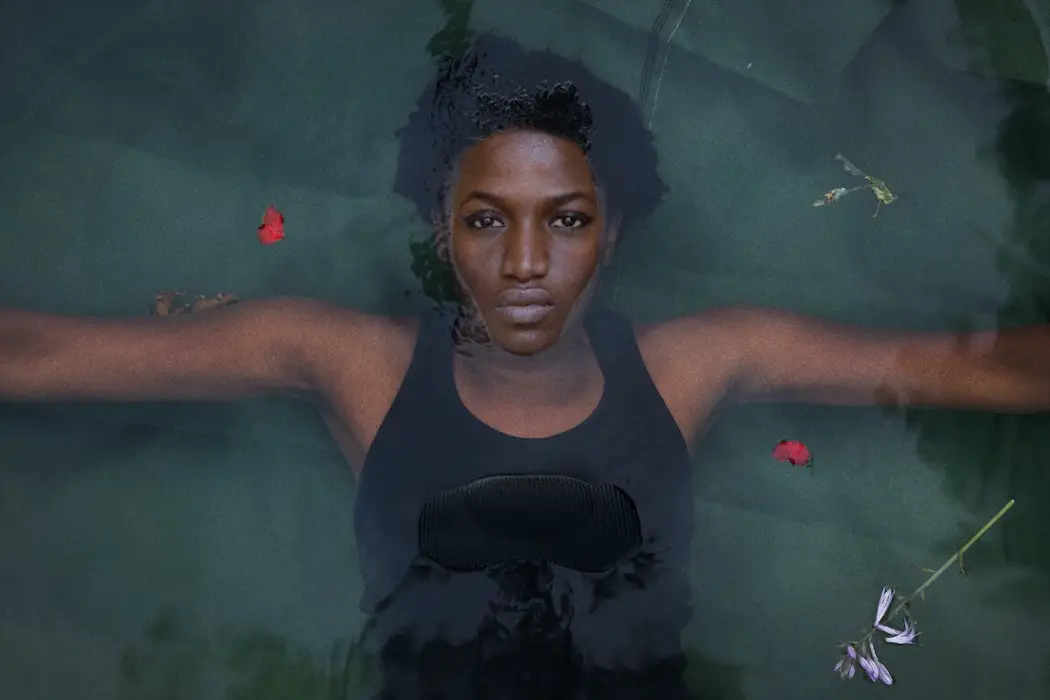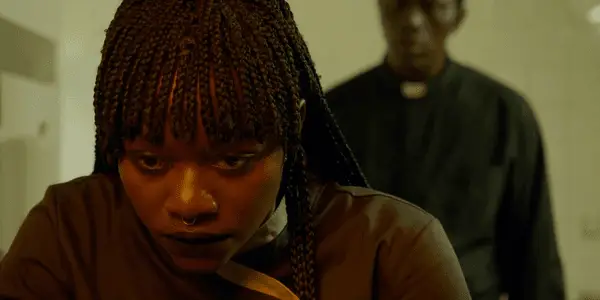New African Film Festival 2023: XALÉ, BRAVO, BURKINA!, THE BLUE CAFTAN & OUR FATHER, THE DEVIL

Soham Gadre is a writer/filmmaker in the Washington D.C. area.…
If there was one theme running through the latest edition of the New African Film Festival, its eighth annual one, it was that of an increasingly desolate economic landscape that has preyed upon the most vulnerable in society and left the true tradesmen and craftsmen of society in the dust. This theme was also prevalent both in the Sundance Film Festival selections earlier this year as well as many of the independent and foreign titles at the Toronto Film Festival last fall (Hollywood of course, blind to politics, churned out a half-dozen self-congratulatory “magic of the movies” movies).
Every film I saw at NAFF this year had protagonists who were in ways overworked, under-compensated, and finding any way to escape the crushing realities of their labor obligations. They approach them in different ways and signal a concern of the greater global society looking to the intangible and spiritual in order to tame the harsh and uncompromising material realities of our existence.
Xalé (Moussa Sene Absa)

Moussa Sene Absa’s Xalé is probably my least favorite of what I saw but it had an interesting familial thread that ties the ways in which men and women seek liberation in modern Senegalese society through two twins Awa (Nguissaly Barry) and Adama (Mabeye Diol), following separate paths to a sort of ‘freedom’ that they can’t find in their current situation. While Awa’s burgeoning adolescence sends her to seek the thrills of nightlife and romance. She meets a young classmate of hers but their date keeps getting interrupted by her traditionalist uncle whose arranged marriage to her aunt is falling apart. Her brother Adama sees his growth into a man as an opportunity to migrate to Europe and start a new life. By day, he is a street seller wearing a clapboard with sunglasses and phone-charger cords on it, weaving between cars looking for potential customers. By night, he dreams about France while his friends make fun of him.
The film incorporates West African storytelling traditions with choruses of men and women in-narrative singing songs that relay philosophical lessons surrounding the stories. It also features a griot (in West African tradition, a storyteller) who dispenses bits of wisdom throughout. Juxtaposing these elements with both the pros and cons of modern life in Senegal create layers of cultural dynamics in the film. When Awa is molested by her uncle Atoumane (Ibrahima M’Baye) and chooses to raise the baby as a single mother, seen as a controversial decision by her family and community, to say the least, the film considers ways in which new generations take agency of themselves has shifted social conceptions over time. By bookending its scenes of modern youth with traditional ways of storytelling, the women dancing and singing praises for Awa’s strength in independence, Absa relays that modern liberation and traditional cultural precedents are compatible and not at odds with each other.
A story centered on youth and particularly the life of young women, Xalé is a unique blend of the past and present. It considers the ways that the youth of today rebel against traditional roles while also embracing how much the history of Senegal is still present and vibrant. It laments the economic and cultural shifts that have left people disillusioned while also questioning the legitimacy of migration to Europe as a guarantee of freedom, especially considering the colonial histories that the continent has had in Africa.
Bravo, Burkina! (Walé Oyéjidé)

One would hope that when we talk about representation at the Oscars, specifically for Black artists, we’d be talking more about movies like Walé Oyéjidé’s Bravo Burkina. But of course, a movie like this would never get the theatrical play, nor the campaign money, nor the critical appraisal, nor the grassroots word-of-mouth that Hollywood films and Oscar-hopefuls by studios would get. It’s only 60 minutes long which may not even qualify as a feature in some studio analytics departments’ data spreadsheets and it also plays around with time and linearity in a formalist way, untied to any grand explanatory multiverse theory or to do some moral sermonizing. It’s a movie that, as social media would call it, is a vibe. Not explainable in a logline.
Following the time-traveling journey of a man’s immigration from Burkina Faso to Italy, the film considers the ways that things are both lost and gained in the desire to escape home for a better life. One of the most distinct choices the movie makes is to cast different actors for the same character depending on whether they are in Burkina Faso or Italy. The idea of becoming thoroughly changed through geographic and cultural shifts is prevalent throughout the film. It juxtaposes the farmlands of Burkina with Italy’s cobblestoned alleyways but it doesn’t try to evaluate any of these places or create its socio-political tones from their differences. Instead, what it considers is the way that people find happiness through different aspects of life. The persecution and racism of immigration to Europe but the beauty and grandeur of its locales and the feeling of finding stability – in a job, a place to live, romance – but then the happiness found in familiarity and blood in your homeland.
Like Xalé this film too is steeped in folkloric myths, or at least, the façades of one. A shaman tells the young protagonist that if he crosses the water, he will gain everything but lose everything as well. He continues to see iterations of the shaman through Italy and his encounters transport him back and forth both in the mind – layers of visions and dreams of his homeland – and in reality. The movie questions whether life-changing decisions can be redone, metaphorically speaking to the colonialism that Burkina Faso faced under French rule (when it was called Upper Volta). The movie’s dialogue is almost all in Italian, and Oyéjidé’s costumes (his designs were used in Black Panther: Wakanda Forever) themselves are symbolic of a meshing of cultures and time – they feature traditional styles mixed with modern flairs. Likewise, Bravo, Burkina! seeks to reclaim the influences of the Europeans on West African cultures in a bold new way that speaks to an artist’s intent.
The Blue Caftan (Maryam Touzani)

Crises of modernization are always tied in one way or another to the economics of labor. The Blue Caftan is a film that wraps its story in a forbidden romantic triangle, but at the heart is the struggle of the titular object – an object of obsessive craftsmanship, painstaking labor, and a level of artistry that is all but disappearing before our eyes. When Halim (Saleh Bakri) greets an unscrupulous and impatient customer who is looking for the caftan to be ready for her daughter as soon as possible, his caring and strong-headed wife Mina (Lubna Azabal) yells at her – “he’ll be done with it when he is”. Maryam Touzani’s camera shifts focus between hands and the objects and people they touch often to draw a comparison between the ways that art and love create the same sort of sensations.
When Halim comes up behind his younger and good-looking apprentice Youssef (Ayub Missioui), he guides his hand to the stitching and tailoring. The intimacy involved in both human relationships and those between an artist and his art is relayed time and again in the film. The romance that evolves is also complex and refreshingly inexplicably in its refusal to show betrayal or uncompromising. Instead, there is a love that Ahmed shares with both Moussad and Alma. The film uses these two juxtapose two types of intimacy – that of passion or impulse and that of a long bond built over time. Similarly, we see this dichotomy displayed in two distinct parts of Ahmed’s life, one of pure impulse in a secluded gay club where he has sex with other men, and in his shop where the long and painstaking process of designing caftans takes place.
There is a recurring song that plays outside of Halim and Mina’s apartment that soon becomes a sort of escape for them, especially when Mina gets sick and the doctors can’t help anymore. A moment culminates between all three of the main characters when they dance to the song after dinner, signifying a bond between the three of them that supersedes their individual relationships with one another. In Touzani’s film, love requires patience, care, and a compromise between impulse and building something meaningful over time.
Our Father, The Devil (Ellie Foumbi)

This is a film of two seemingly incompatible modes that come together in an inexplicably decent way. A lot of sequences in Our Father, The Devil teeter on the brink of going completely off the rails and destroying a perfectly terrifying set-up. In some ways, the movie does trip itself into becoming a B-movie potboiler but it certainly isn’t following any worn-out cliches. The first twenty minutes are some of the strongest filmmaking I’ve seen this year. Ellie Foumbi’s camera at first refuses to fit the charismatic priest Father Patrick (Soulemayne Sy Savane) in the frame. His eyes and his legs are always cut off. We hear his deep and reverberating voice speak in sermons that Marie Cissé (Babetida Sadjo), a head chef at a retirement home, feels echoing in the empty white corridors of the building. When she finally sees him, we realize something is terribly wrong.
The film forgoes the slow-burn approach that its opening scenes suggest when Marie Cissé reconfirms her suspicion that Father Patrick is the “reformed” brutal warlord who killed her family in Africa. She hits him over the head with a pan in a moment that shatters the silence that the film held on to up until then. The priest ends up tied in Marie’s rural shed-home and the movie takes two significant shifts – it turns our protagonist into a vicious and sadistic vigilante and it begins to question the ideas of vengeance and reformation in a spiritual context. The latter is important because while the movie deals with Christianity and the Bible as points of reference I feel that you need not be Christian nor religious at all to consider the ways in which it questions its two protagonists.
Foumbi leaves the veracity of Cissé’s claims in the air. There are notions, hunches, hints – like how Father Patrick dips his spoon a few times before putting it in his mouth – that are traumatic for her. The trauma she experiences is rooted deep inside and it manifests both in animosity towards Father Patrick, namely in torturing him as revenge, but also animosity to the people she cares about, who she continually pushes away. The film takes a bold chance to consider the strength of forgiveness in the face of depravity. It doesn’t shy away from turning its back on our root impulses as viewers to want to file away characters in a binary, to morally justify acts of violence, and to take sides in the debate over what trauma or what violence is worse than another.
Does content like this matter to you?
Become a Member and support film journalism. Unlock access to all of Film Inquiry`s great articles. Join a community of like-minded readers who are passionate about cinema - get access to our private members Network, give back to independent filmmakers, and more.
Soham Gadre is a writer/filmmaker in the Washington D.C. area. He has written for Hyperallergic, MUBI Notebook, Popula, Vague Visages, and Bustle among others. He also works full-time for an environmental non-profit and is a screener for the Environmental Film Festival. Outside of film, he is a Chicago Bulls fan and frequenter of gastropubs.













